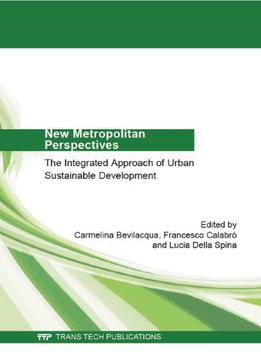
New Metropolitan Perspectives: The Integrated Approach Of Urban Sustainable Development
by Carmelina Bevilacqua /
2014 / English / PDF
56.3 MB Download
PREFACE This volume contains the proceedings for the 1st International "NEW METROPOLITAN PERSPECTIVES. The integrated approach of Urban Sustainable Development through the implementation of Horizon/Europe2020" (ISTH2020). The integrated approach of urban Sustainable Development through the implementation of Horizon/Europe2020, which took place on 6 to 8 May, 2014, in Reggio Calabria, Italy. The 1st International Symposium represented the final event related to the three years research programme of the CLUDs project ‐ funded by the Seventh Framework Programme, IRSES, Marie Curie action ‐and promoted the LaborEst’ research activities on urban dynamics within metropolitan scenarios. The Symposium has been organised by the LaborEst (Evaluation and Economic Appraisal Lab) and CLUDs(Commercial Local Urban Districts) Research Lab, Mediterranean University of Reggio Calabria (Italy) with the aim to receive contributions from national and international scientific community on integrated urban sustainable development strategies with particular focuses on metropolitan dynamics and urban rural linkages. The Symposium was conceived with the goal of achieving the following objectives: 1. Strengthening the international exchange in order to promote joint research activities according to the objectives of the 2014–2020 programming period with respect the broad field of Sustainable urban development. 2. Stimulating the debate on community involvement and on new forms of public‐private partnership within urban‐rural networks and metropolitan areas. 3. Promoting an integrated approach through specialised inputs merging on the creation of strongly localised ‐ and not generalised ‐ interventions and actions, fostering a bottom‐up, rather than top‐down approach, or a mix approach too. Cities are currently dealing with challenging issues, such as climate changes, social exclusion, the current economic and financial crisis, which are pushing towards the re‐definition of new sustainable development strategies. Particularly, the need to review the urban and metropolitan governance systems emerges, encouraging the involvement of local communities, strengthening the public‐private partnerships throughout the implementation of new flexible and place‐based approaches. The Symposium is focused on the comprehension of metropolitan dynamics in order to promote local economic development, especially in urban and rural context and in so‐called marginal areas. Considerations have been driven to explore on cities’ ability to implement metropolitan dynamics and improve their competitiveness exploiting the virtuous and synergic linkage between urban and rural areas. The reflection on the city with respect the metropolitan dynamics, on one hand, and how the urban rural linkages can affect them, on the other, drives to think the urban space construction as a community awareness process. A dynamic process of making spaces enable to change and evolve the forms of relationships, to connect the local identity with innovation, to share and spread knowledge, with the common objective to create mutual‐awareness of the place. Even the competitiveness of cities and territories has become a general purpose in the political agenda to promote local development, sustainability principles keep being the only driver to implement equity distribution of competitive advantages ensuring development process. For the first International Symposium NEW METROPOLITAN PERSPECTIVES. The integrated approach of Urban Sustainable Development through the implementation of Horizon/Europe 2020 we aimed at opening to provide a forum for exchange and discussion on all aspects of the urban environment related with the wide connections ‐ functional, economical, social, morphological, financial – among cities, metropolitan areas, urban‐rural fringe and marginal areas by emphasising the role of community, stakeholders, policy actors in shaping the future of the cites.











